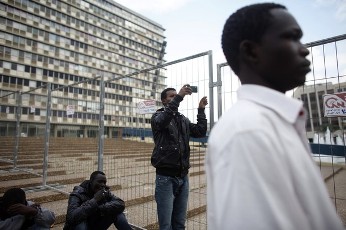Israeli court rules in favor of Sudanese migrant against interior ministry
February 17, 2011 (WASHINGTON) – An Israeli court issued an opinion this week saying that restrictions included in a visa of a Sudanese migrant is illegal and should be removed, according to a newspaper report.

According to the newspaper Hijab is from the restive region of Darfur who arrived in 2008. He was arrested for crossing the border illegally and placed in detention for a year and a half.
The Israeli authorities grants Sudanese and Eritrean migrants Temporary Protected Status once their nationality is ascertained. The visa issued to them is known as 2 Aleph 5 visas which they then have to renew on a periodic basis.
This status however, does not give the migrants the formal right to work in the country and recently the Israeli cabinet decided that migrants cannot be prevented from working unless a humanitarian solution was found for the migrants in the form of a holding facility, set to be constructed in the south, where the migrants will be able to turn for their basic needs..
Three months ago, however, the Interior Ministry began for the first time to print a statement on these visas that read: “the temporary permit does not constitute a work permit.”
Fearful that the statement would prevent employers from hiring him, Hijab filed a complaint to the court, stating that the ministry’s actions placed it in contempt of the court’s prior decision regarding Hijab, which specifically stated that he was allowed to work as he has proved to be a Sudanese.
In her response to the complaint, the Interior Ministry’s lawyer argued that the permit carrying the statement did not contravene the court’s decision since it didn’t state that the bearer was not allowed to work, only that the visa didn’t constitute a work permit and that Hijab’s right to work was granted by the judge’s original verdict.
The judge didn’t accept the ministry’s position. In his ruling he wrote that any reasonable person reading the permit would be led to understand that Hijab was not allowed to work.
“You can’t place the duty on the petitioner, a Sudanese citizen who arrived here after escaping a war zone, to explain to potential employers that they can legally employ him despite what it says on the permit issued him by the Interior Ministry and that the verdict carries more authority than the visa,” wrote the judge in his ruling. “Clearly it will prevent him, or at least make it exceedingly difficult for him, to find an employer.”
But the judge dismissed the contempt charges, stating that the problem might have arisen because of a mistake or a misunderstanding, but ordered the Interior Ministry to issue Hijab a new visa, making no reference to the right to work.
Hijab’s lawyer told The Jerusalem Post that he was doubtful whether the ruling would make the Interior Ministry change its policies regarding the permits of the rest of the Sudanese and Eritrean nationals living in Israel, but that it was an important precedent for future petitions of a similar nature.
Israel, population 7.2 million, says the migrants from Sudan, Eritrea and other African countries come mostly in search of work, rather than asylum.
To stem the influx, Israel has been erecting a fence along its porous desert border with Egypt. Furthermore, the Jewish state has been working with NGO’s to repatriate Sudanese migrants through a third country.
(ST)

Ajok Garang
Israeli court rules in favor of Sudanese migrant against interior ministry
It is a very good idea in respect of International law ,we also have Isreali who will be traveling to Sudan .And there is need to remove that tough law on the Sudanese including southern Sudanese not only the people in Khartoum ,for the instate relations to co,exist there is need to respect the sovernity of other state .
Ajok Garang Ajok .
Padiet Deng Alony
Israeli court rules in favor of Sudanese migrant against interior ministry
South Sudan is now a separate country from north sudan and should not be accountable with north sudan charges.
let differentiate them